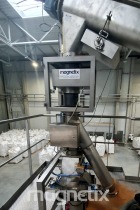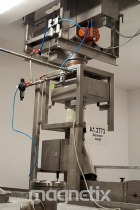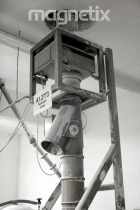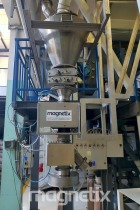Products
Metal separator DMR
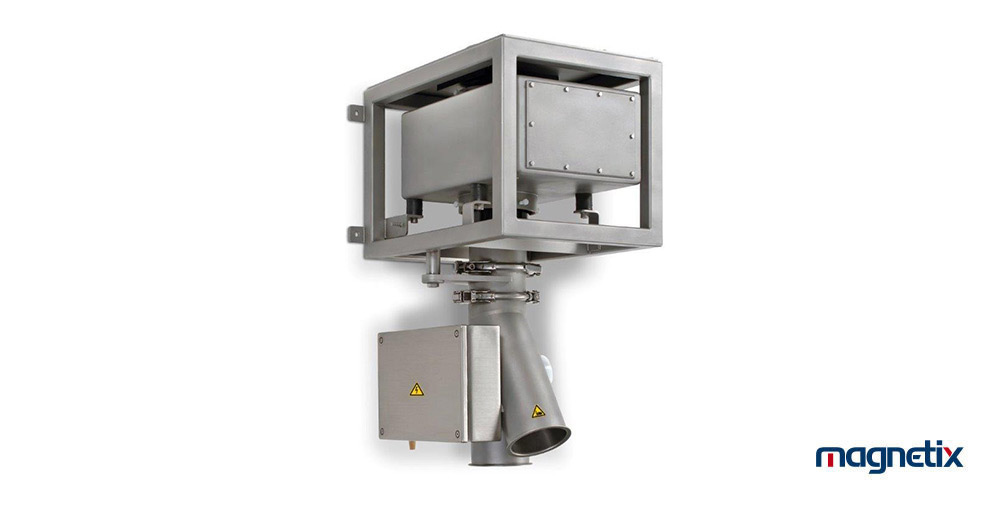

The DMR type metal separator is designed to detect and automatically remove ferrous and non-ferrous metals from bulk materials in free fall conveying lines. The DMR separator protects process machines against damage caused by metal contamination, prevents production downtime and ensures product quality.
The DMR metal separator is reliable, easy to use and designed for continuous operation. The metal separator has the highest separation efficiency of metal contaminants (magnetic and non-magnetic). The DMR separator meets the requirements of food quality management systems ISO 9001, ISO 22000, HACCP, BRC, IFS.
Features of metal separators from Magnetix
- Custom-made metal separator according to individual requirements.
- Robust and durable design for continuous operation 24/7 under difficult working conditions.
- High-sensitivity detection and automatic separation of ferrous and non-ferrous metals as well as stainless steel.
- State-of-the-art DSP digital signal processing technology.
- Quick and simple installation of the metal separator in the pipeline using the Jacob pipe connection system.
- Diameter of the separator inlet opening up to 400 mm.
- Minimal loss of transported product thanks to ultra-fast separation unit.
- Various installation possibilities through the modular design of the metal separator.
- Individual location of outlets depending on the location of the contamination container.
- Hygienic design with materials approved for contact with food (FDA approved).
- High resistance to vibration, shocks, and temperature fluctuations.
- Operating temperature up to 80°C.
- Intuitive operation using a membrane keyboard or touch screen.
- Electronic adjustment of scanning sensitivity.
- Automatic teach-in mode (Auto-Set) to mask out intrinsic conductivity of products and environmental influence.
- Memory for 300 different products.
- Control audit in accordance with the requirements of HACCP, IFS, BRC systems.
- Event log with RTC real-time clock with power backup.
- Data transmission from the detector and connection to the company network.
- Remote operation, diagnostics and central data management.
Applications of metal separators
- Metal separation from dusty food products (sugar, coffee, flour, spices, milk powder, breadcrumbs, etc.)
- Metal separation from fine-grained food products (cereals, pasta, French fries, popcorn, grains, nuts, etc.)
- Removal of metals from bulk ingredients of pharmaceutical products.
- Separation of metals from regrind and plastic granulates - protection of extruders and calenders.
- Separation of metals from limestone flour and construction mixtures.
- Separation of metals from loose or granulated mineral and chemical fertilizers.
The DMR metal separator is widely used in industry, ensures the highest separation efficiency of metal contaminants and guarantees the purity of the processed product.
Versions of metal separators
- DMR4 type metal separator
Equipped with quick-flap separation unit intended for bulk materials with a grain size of up to 8 mm. - DMR5 type metal separator
Equipped with a specially designed separation unit intended for dusty food products with a grain size of up to 8 mm;
Hygienic design, easy to clean, with no dead spaces where the product could accumulate. - DMR6 type metal separator
Equipped with a swivel funnel intended for coarse-grained, flaky, fibrous and humid bulk materials with a grain size of up to 20 mm;
Hygienic design and easy to clean. - DMR-EX type explosion-proof separator
Manufactured in compliance with the ATEX directive and certified by a notified body.
Working principle of the metal separator
The tested product moves through the metal detector tunnel. The detector creates a high-frequency electromagnetic field throughout the entire transport tunnel area - no dead zones. The electromagnetic field generated by the transmitting coil induces a certain signal in the receiving coil. The metal contained in the product deforms the electromagnetic field lines generated by the transmitting coil, thereby changing the amplitude and phase of the signal induced in the receiving coil. The received signal is analyzed by the detector's electronic system and converted into a metal detection signal that initiates the operation of a separation unit, which removes the detected metal along with a small amount of the product. The detector sensitivity and operation time of the separation unit are adjusted using a digital controller.
Why choose our metal separators?
DMR metal separators are designed to work with bulk materials transported by gravity. Due to the wide range of available inlet diameters from 30 to 400 mm, they can be used in most existing free fall systems. Thanks to various variants of the separation unit, they can be used with products such as: granulates and regranulates, grains, herbs, spices, flour, milk powder, granulated and powdered sugar, soda, pasta, flakes, chips and even foil flakes and wood chips.
The separators have a solid frame made of stainless steel and JACOB® standard connections, which enable quick and stable installation of the device in the process line. Separation unit with the "EasyClean" system facilitate cleaning when changing the type of product or its batch, which translates into reduced costs of line downtime. The "Quick Flap" rejection system ensures the lowest loss of good product during the separation process. Separators can be made to work with high-temperature products and also to work in explosion-hazardous zones.
An advanced control unit with a multi-range search frequency (DUO technology) allows for optimal detection sensitivity and the highest product purity. A touch display with visualization of the product and ongoing processes enables simple operation and saves time by quickly setting the detector parameters. The quality control program complies with IFS, BRC, HAACP and ISO 22000 standards. DMR metal separators can be equipped with interfaces enabling communication in technological networks. This allows you to save time by communicating with an individual device and monitoring work in real time. Factory certificates and approvals, which the customer receives upon request, are solid arguments during internal and external audits.
Metal separator price and delivery date
Based on the working conditions specified by the Customer, the appropriate type of separator is selected and its price is determined, which depends primarily on the diameter of the inlet opening, the type of separating mechanics and the electronics used to evaluate the data. Mounting accessories are priced individually based on an analysis of the specific location of the device.
The delivery date of the device on order is usually 6 - 8 weeks. We also fulfill orders with an accelerated deadline. Magnetix also has a large warehouse of separators available immediately.







